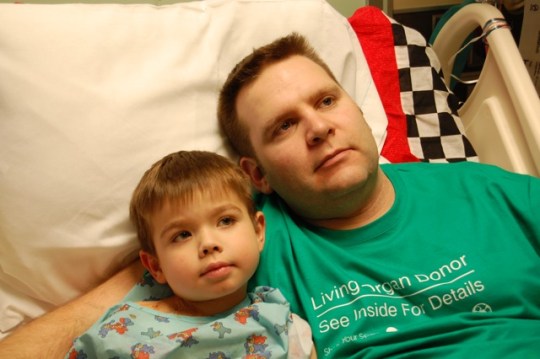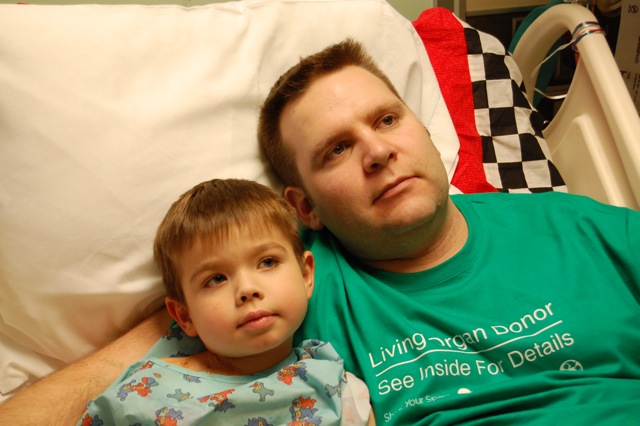
Hyde Talbot’s young life has been one medical complication after another, the result of a rare genetic defect that eventually rendered his kidneys useless. Now, thanks to a new kidney donated by his uncle – and with the assistance of a new and very expensive drug – the 4-year-old from Cumming and his family may finally be getting some sense of normalcy in their lives.
Hyde’s transplant took place at Children’s Healthcare of Atlanta at Egleston in early February, restoring his body’s natural ability to filter toxins from his bloodstream. But the transplant alone would not have been enough to ensure the boy’s health. The experimental drug that doctors hope will do that – Soliris (generic name eculizumab) – costs more than $400,000 a year and was classified recently as the most expensive drug in the world.
The high cost of Hyde’s treatment – his mother estimates that the family’s insurance plan and other payers have spent more than $700,000 already – illustrates how expensive that breakthroughs in lifesaving care can be. The family’s health insurance plan has a lifetime cap of $2 million, which could easily be exceeded in the next few years, given the expense of the drug and the vigilance his medical team must have to maintain his health.
Moreover, Medicare’s special program that pays for kidney dialysis and transplants – regardless of the patient’s age – covers transplant
medications for just three years. After that, the family will have to rely on private insurance, Medicaid or some other means of paying for Hyde’s ongoing care. Still, they are confident that things will work out because of the support they have already received from their family, friends and neighbors – a group that puts together the annual Hike4Hyde fundraiser.
“Yes, we are living with some uncertainty, but we’ve done that almost since Hyde was born,” Phyllis Talbot says. She has followed with great interest the debate in Congress about changing the nation’s health insurance regulations.
“The new health care law removed the cap for children’s coverage, so if the law is overturned we’d be out of luck, I guess,” she said. “We’d have to rely on some of the public programs, which have been very helpful. But right now we just want to concentrate on getting him better.”
Hyde’s underlying medical problem, atypical hemolytic-uremic syndrome (aHUS), is diagnosed in only about 300 to 600 patients per year in the United States. It is caused by a mutation of the gene that produces Factor H, which controls the body’s immune system. The immune system in aHUS patients damages the small blood vessels of the body, especially those in the kidneys.
Treatment dilemma
Diagnosed at 18 months, Hyde has been through one complication after another, including severe high blood pressure, anemia, low platelet counts and life-threatening infections. He spent almost as much time in the hospital as he did at home. Eventually his kidneys had to be removed and he spent nights at home hooked up to a dialysis machine. Without the dialysis, he would have died.
Dr. Larry Greenbaum, chairman of nephrology pediatrics at Emory University School of Medicine, said he and the Talbots considered a kidney and liver transplant for Hyde but rejected the idea because the double procedure was very risky in children and the long-term success rate wasn’t good enough. They concentrated instead on trying to keep the disease from flaring up and doing further damage.
But that changed when preliminary reports about using Soliris in patients with aHUS began to surface last year in medical journals and scientific meetings. The FDA approved the drug in March of 2007 for patients with another rare disorder, paroxysymal nocturnal hemoglobinuria (PNH). Because of the FDA’s approval, most health insurance companies have agreed to pay for Soliris in PNH patients despite its high cost. (The drug’s manufacturer, Alexion, says the medication – which has to be delivered intravenously – cost more than $800 million to develop.)
Still, the use of Soliris in conjunction with kidney transplantation for patients with aHUS was considered highly experimental, Dr. Greenbaum said. The Emory specialist, who is a clinical investigator for Alexion, said he knew of only a handful of patients worldwide who had undergone the procedure. Solaris prevents the immune system from damaging the blood vessels of children with aHUS, which in turn protects the kidneys. It also prevents the blood cell damage that occurs in patients with the condition.
Phyllis Talbot and her husband, Bill, had studied the options carefully. They are active in the Foundation for Children with aHUS, which raises money for research and treatment for the disease. They quickly agreed to the experimental therapy for Hyde.
Fundraiser in April
“They are amazing, really,” Dr. Greenbaum said of the Talbots. “They would come to me with studies before I had even had a chance to read them in the scientific literature. They stayed on top of it.”
Phyllis Talbot said immediate family members were not considered as potential kidney donors because of the genetic link to the disease. But they were stunned to learn that of all the friends who volunteered to be tested to become donors, Hyde’s uncle, Warren Chase of Milford, Pa., was a near-perfect match.
After a first infusion with the drug in January, Hyde’s operation in early February was successful. The new kidney began functioning almost immediately. He stayed in the hospital for 10 days after the surgery and returned to his home in Cumming without needing dialysis.
He has to return to the hospital periodically for blood tests, and he’ll have to go back every two weeks for continued infusions of Soliris. But for now, his mother said, he is doing well and taking on the lifestyle of a normal 4-year-old.
Hyde was able to get this far because of the extraordinary efforts of his medical team and family and friends who have rallied around him, she said.
The annual Hike4Hyde, a fundraiser organized by friends three years ago, has already raised $53,000 – all of which has gone to the Foundation for Children with aHUS and Children’s HealthCare of Atlanta. This year’s event at the Sawnee Mountain Nature Preserve in Cumming is April 16. Here’s a website for the hike.

